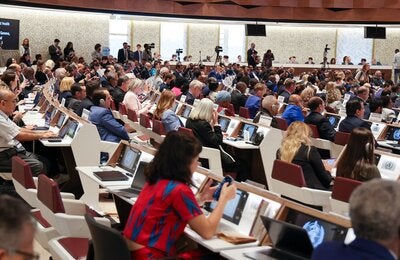
Miami, Florida, May 14, 2024 (PAHO) -- Ministry of Health representatives from 24 Caribbean countries took part in a Pan American Health Organization (PAHO) workshop aimed at strengthening the use of risk communications and community engagement (RCCE), to manage and mitigate health emergencies and improve vaccine uptake.
“RCCE is key for preparedness and response to public health emergencies, as it allows populations to make evidence- and science-based decisions to protect their lives and families when facing a threat,” said Dr. Ciro Ugarte, Director of PAHO's Health Emergencies Department. “This workshop has allowed Member States in the Caribbean to strengthen their capacity to use RCCE to cope with health emergencies, fortifying the areas of processes, mechanisms, and human resources in particular.”
Participants included leads for communications and health promotion, functions that play a key role to prepare, respond and mitigate health emergencies. This workshop was a joint initiative of several PAHO entities: the Health Emergencies Department, the Comprehensive Immunizations Program, and the Caribbean Subregional Program Office. The Caribbean Public Health Agency (CARPHA), and the World Health Organization (WHO) Risk Communication, Community Engagement and Infodemic Management Team (RCCE IM) also participated and supported this workshop.
During the three days, the participants engaged in several training methodologies, applying RCCE strategies to common health threats in the subregion, including climate-related emergencies such as storms, hurricanes, heatwaves, disease outbreaks, and crises generated by Events Supposedly Attributable to Vaccination or Immunization (ESAVI).
Dr. Ljubica Latinovic from WHO HQ Health Emergencies Program, RCCE IM team, conducted an infodemic management exercise on how to use 6 steps to develop an infodemic insights report focused on the introduction of new vaccines, and presented the draft of a dengue RCCE readiness and response toolkit to country representatives; the aim was to test the utility of the proposed tools and generate input that will contribute to the finalization of the toolkit.
Other topics discussed included a review of the RCCE capacity in the context of International Health Regulations (2005), the use of RCCE strategies for mass gathering events; the latter session, which was led by CARPHA, was vital, considering that the Caribbean is preparing to receive fans of the Cricket World Cup in June 2024.
Participants were able to put what they learned about RCCE and crisis communication for immunization into practice through in-depth case studies and group work focusing on topics such as risk perception, pharmacovigilance and AEFI (Adverse event following immunization), collaborating with partners, and building social listening strategy for the introduction of a new vaccine and managing mis- and disinformation.
During his opening remarks, Mr. Dean Chambliss, PAHO Subregional Program Director for the Caribbean, highlighted the rising importance of RCCE for health emergencies in the subregion: “The Caribbean faces unique vulnerability, which requires robust RCCE to safeguard both our local communities and our visitors. Climate change and its impact on health and livelihoods are especially concerning. Extreme weather events can cause respiratory illnesses, exacerbate cardiovascular and non-communicable diseases, increase water and vector-borne diseases, and impact mental health. Additionally, the region's dependence on a tourism-driven economy exposes the Caribbean people to heightened risks, including communicable diseases, which can be precipitated by large gatherings and international travel such as the upcoming ICC T20 Cricket World Cup.”
Dr Mark Sami, Director, Corporate Services at CARPHA, emphasized that health communicators contribute to life saving work. “A “work” that is by no means easy, because there can be so many challenges to effective health communication. In spite of these challenges, communications specialists offer valuable and sound guidance, so that public health officials can provide the right messages – that are accurate and verifiable, at the right time, from the right people. CARPHA acknowledges that under the International Health Regulations, risk communication is one of eight core capacities, and we fully support the Pan American Health Organization, PAHO, in facilitating this capacity building workshop geared at improving the Caribbean region’s risk communication and community engagement or RCCE skills,” he noted.
The Caribbean workshop is part of a series of training sessions that PAHO has hosted since March 2023 for each of its subregions as an interprogrammatic effort to act on one of the most important lessons of the COVID-19 pandemic: the need to strengthen the RCCE capacity of Ministries of Health using a multi-hazard approach that highlights risk communications as key for health emergency preparedness and response. The workshop was also an opportunity to present the new virtual course on Risk Communications and Community Engagement for Health Emergencies, a self-paced 7-module theoretical course that is available in PAHO’s Virtual Campus for Public Health.
This workshop, as well as the previous Risk Communications and Community Engagement subregional workshops for Central America and South America (2023), and the development of the online course on RCCE for health emergencies in English and Spanish, have been possible thanks to the contribution of Global Affairs Canada.
This activity was also possible thanks to the EU/CARIFORUM Climate Change and Health Project, Strengthening Climate Resilient Health Systems in the Caribbean




